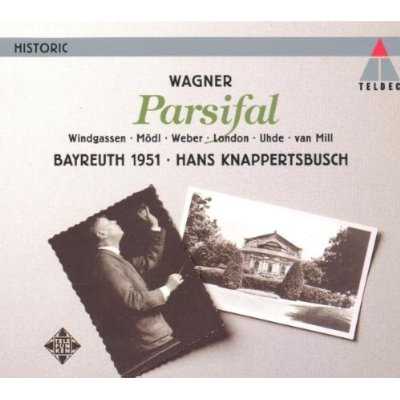
Orchestra: Bayreuth Festival Orchestra
Conductor: Hans Knappertsbusch
Composer: Richard Wagner
Audio CD
SPARS Code: A-D
Number of Discs: 4
Format: FLAC (image+cue)
Label: Teldec
Size: 1.08 GB
Recovery: +3%
Scan: no
Parsifal, opera, WWV 111
Composed by Richard Wagner
Performed by Bayreuth Festival Orchestra
with George London, Gerhard Stolze, Paula Brivkalne, Walther Fritz, Hildegard Schunemann, Wolfgang Windgassen, Arnold van Mill, Elfriede Wild, Gunther Baldauf, Ruth Siewert, Hermann Uhde, Ludwig Weber, Maria Lacorn, Werner Faulhaber, Erika Zimmermann, Martha Modl, Hanna Ludwig
Conducted by Hans Knappertsbusch
Amfortas – George London
Titurel – Arnold van Mill
Gurnemanz – Ludwig Weber
Parsifal – Wolfgang Windgassen
Klingsor – Hermann Uhde
Kundry – Martha Mödl
Disc 1
01. Vorspiel
02. Act 1. He! Ho! Waldhüter ihr
03. Act 1. Recht so! – Habt Dank! – Ein wenig Rast
04. Act 1. Nicht Dank! – Haha! Was wird es helfen?
05. Act 1. O wunden-wundervoller heiliger Speer!
06. Act 1. Titurel, der fromme Held
07. Act 1. Weh! Weh!… Hoho!
08. Act 1. Nun sag! Nichts weißt du
Disc 2
01. Act 1. Vom Bade kehrt der König heim
02. Act 1. Verwandlungmusik
03. Act 1. Nun achte wohl und laß mich seh’n
04. Act 1. Mein Sohn Amfortas, bist du am Amt?
05. Act 1. Enthüllet den Gral!
06. Act 1. Wein und Brot des letzten Mahles
07. Act 2. Vorspiel
08. Act 2. Die Zeit ist da
09. Act 2. Ach! Ach! Tiefe Nacht!
Disc 3
01. Act 2. Hier war das Tosen! Hier! Hier!
02. Act 2. Komm, komm, holder Knabe!
03. Act 2. Parsifal! – Weile!
04. Act 2. Dies alles – hab’ ich nun geträumt?
05. Act 2. Ich sah das Kind
06. Act 2. Wehe! Wehe! Was tat ich? Wo war ich?
07. Act 2. Amfortas! Die Wunde!
08. Act 2. Grausamer! Fühlst du im Herzen
09. Act 2. Vergeh, unseliges Weib!
10. Act 3. Vorspiel
11. Act 3. Von dorther kam das Stöhnen
12. Act 3. Heil dir, mein Gast!
Disc 4
01. Act 3. Ja! Woher kommst du denn?
02. Act 3. Heil mir, daß ich dich wiederfinde!
03. Act 3. O Herr! War es ein Fluch
04. Act 3. Nicht so! Die heil’ge Quelle selbst
05. Act 3. Gesegnet sei, du Reiner, durch das Reine!
06. Act 3. Wie dükt mich doch die Aue
07. Act 3. Du siehst, das ist nicht so
08. Act 3. Mittag. Die Stund’ ist da
09. Act 3. Geleiten wir im bergenden Schrein
10. Act 3. Nur eine Waffe taugt
11. Act 3. Höchsten Heiles Wunder!
knappertsbusch_wagner_parsifal02.rar – 280.0 MB
knappertsbusch_wagner_parsifal03.rar – 296.8 MB
knappertsbusch_wagner_parsifal04.rar – 276.4 MB
The Redeemer Redeemed,,,Literally
Little to add to the long, thoughtful reviews below, except to say this is in my opinion the single greatest recording of any opera, ever. Wagner’s final work is a re-working of the Fisher King myth: how a holy innocent restores fertility to the sickly realm of the Grail Knights, a fallen land in perpetual winter, besieged by a warlock, one of their number gone to the dark side, and his bevvy of flower-tarts/temptresses. Wagner’s text is a potent blend of Christian, Buddhist and Pagan myths; his score, spare, voluptuous, and rapt, the helmet-horned histrionics of yore dialled down to an oozing liquid musical synesthesia that SOUNDS JUST LIKE blood flowing from Christs wound, cleansing water, sacramental wine, tears of compassion — is his very finest, most miraculous achievement.
The reputation of Parsifal is: a)that the proper balance of the meditative, magical, spiritual and erotic is almost impossible to bring off convincingly in performance, and there are far fewer good ones in the Wagner discography than say, The Ring; b)only the acoustics of Wagner’s own Bayreuth theater, for which the score was actually written to order, can reproduce the work properly; and c)Between 1951-1964 conductor Hans Knappertsbusch owned this work as no conductor has ever owned a single opera before or since.
This was Knappertsbusch’s first Bayreuth Parsifal, and while in broadcast mono, it takes the prize. The reason is the sense of occasion. While Hitler had adopted the Wagner family as his own and showered Bayreuth with his largesse, he also quietly banned Parsifal in 1938. (Remember, for all the talk of Wagner as a proto-Nazi, he intended Parsifal to be his defining work, and willed that it be performed at his theater annually in the spirit of a religious ritual; that the Nazis would suppress something so dear to Wagner’s heart indicates that his message of love and compassion was fundamentally at odds with the ideology his name has been tarred by forever). After the war, the theater was shut down by the US occupation while its principals were investigated for their cosiness with Hitler. Finally in 1951, the Wagner grandsons re-opened the rehabilitated, de-Nazified Bayreuth with this very Parsifal. Master record producer John Culshaw recorded it beautifully (I would barely know this was mono); and I believe that this tale of redemption is here so powerfully rendered because everyone involved, including the audience, knew they were witnessing the actual redemption of Wagner, the festival, and a discredited strain of German Romanticsm so hideously co-opted by Hitler. This is the actual sound of cultural re-birth, and if you fall under it’s spell, it will knock you to your knees. Knappertsbusch and co. were not merely performing an opera, they were performing a kind of musical sage-burning ceremony to chase away the demons that had corrupted their stage,their race, their nation, and also, in the process, embracing the spirit of atonement, self-abnegation, universal love and forgivness that is Wagner’s message. It really is no exaggeration to say that this recording was a rite, an exorcism, a purging of evil. And the committment of the performers elevates Parsifal to a level of emotion beyond a mere night at the opera
Legendarily, Knappertsbusch took slow tempos, yet even by his standards this is slow, in fact this is the longest Parsifal on record. Yet it never turns into a taffy-pull, in fact Wagner’s structural underpinnings, the endless melodies morphing from motif to motif, have never been more audible, the climaxes gain from the dammed up tensions of the hushed bits, and the voices are powerfully exposed and naked above the unfurling orchestral carpet. The starry cast — Windgassen, London, Hotter, especially Modl’s unhinged Kundry — has never been bettered. And as I began, the sense of occasion is palpable. Many prefer Knappertsbusch’s 1962 recording on Philips for it’s faster tempo and stereo sonics, and it is great. But this is beyond great — the slightly rusty mono cannot put a brake on what is truly a religious experience, exactly as Wagner intended.
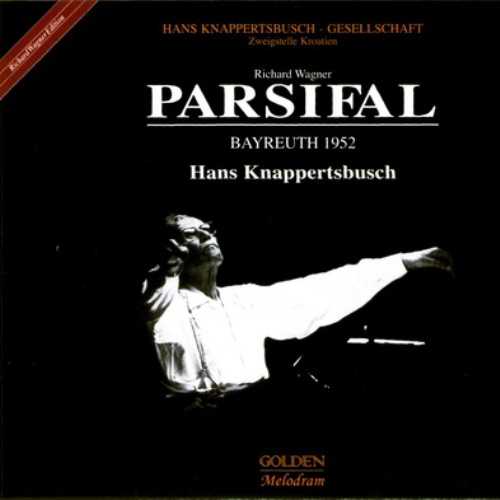
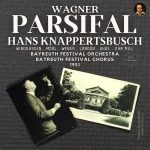
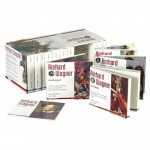
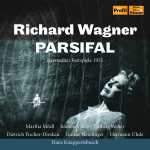
One of the truly great recordings and great sound from the original tapes – thanks much
Thank you very much.